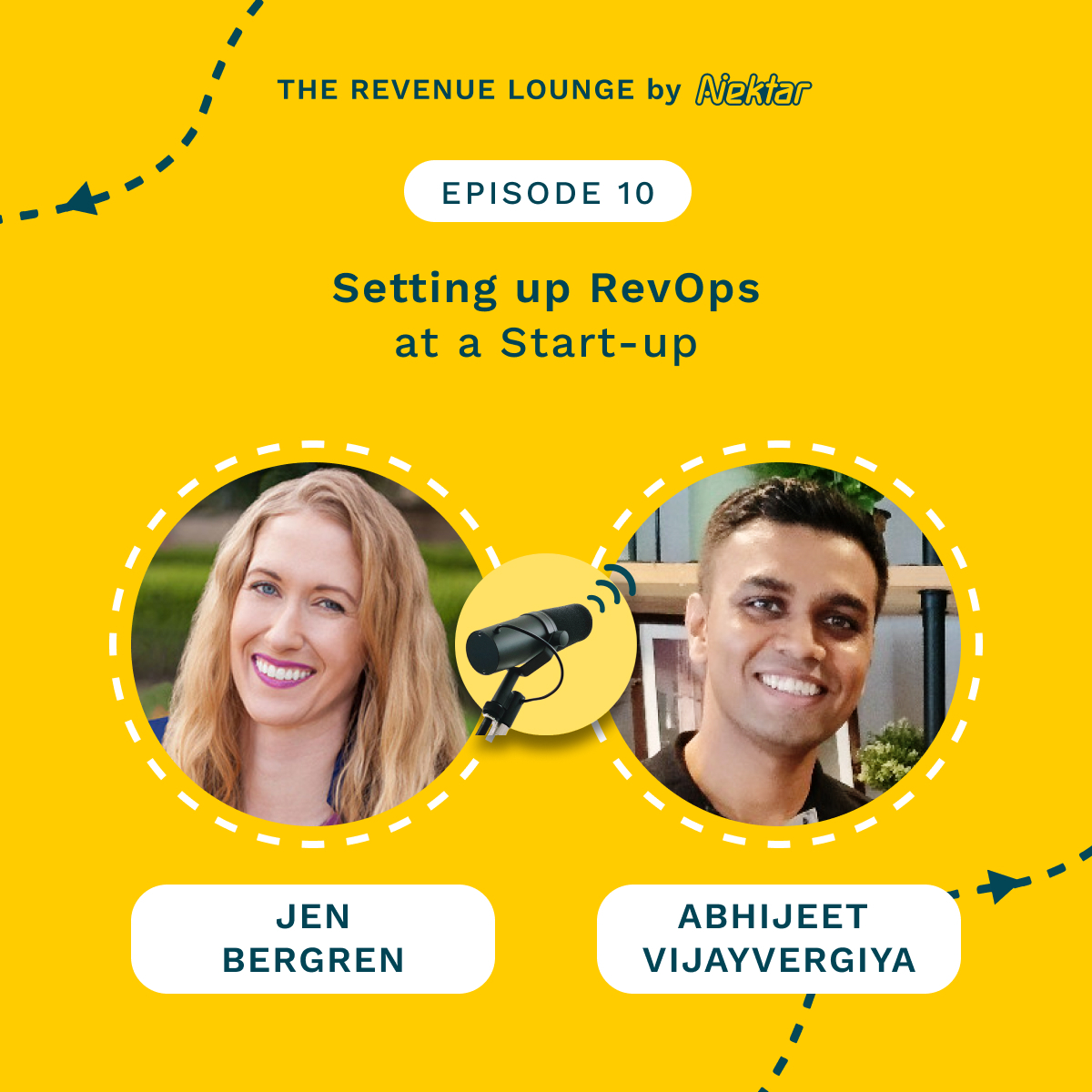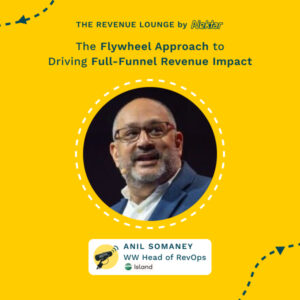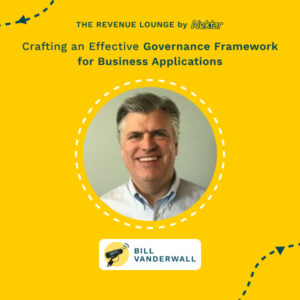Ep 13: RevOps vs SalesOps: Key Differences ft. Lorena Morales
July 18, 2023

About
The Revenue Lounge
The podcast covers stories from leaders across RevOps, Sales, Customer Success, GTM, Data and Marketing about what drives these functions and what advice they would share with our listeners. With 3 seasons recorded, the podcast currently features 50+ enterprise leaders in the B2B SaaS domain. Tune in to hear from the best in the business
Often times we hear revenue leaders cringe when revenue operations is considered an extension of sales operations. But that’s really not the case in reality.
These two functions might have their similarities, but it’s important to understand their core differences.
That’s what we are going to explore in this episode.It’s a pleasure to have Lorena Morales with us today. Lorena is the Director of Global Digital Marketing Revenue Operations at JLL.
She is a RevOps expert and counted among the top RevOps voices in the industry.
Let’s hear it from Lorena!
Want to learn more about Nektar?
Talk to our team – https://nektar.ai/contact-us/
[00:00:00] Hey there folks. Welcome back to yet another episode of the Revenue Lounge podcast. If you are new to this podcast, a very warm welcome. The Revenue Lounge tries to cover everything under the umbrella of revenue operations. So what’s in store for today’s episode? Oftentimes I hear revenue leaders cringe when revenue operations is considered an extension of sales operations.
[00:00:28] But in reality, that’s really not the case. At least, that’s not what we believe in the ecosystem. These two functions might have their similarities, but it’s important to understand the core differences between them. And that’s exactly what we are going to explore in today’s episode. To help us better understand these differences, we have Lorena Morales with us.
[00:00:53] Lorena is the Director of Global Digital Marketing Revenue Operations at JLL. She’s also a RevOps expert and is counted among the top RevOps voices in the industry. Hi Lorena, I’m so excited to welcome you to the Revenue Lounge.
Thank you so much for being a part of this. It’s such an honor and a pleasure to be here among such a stellar group of people that you have interviewed.
[00:01:19] So very honored. Thank you for that. And let’s kick around sales operations and rev ups. What are the differences? Why people tend to get confused about them? Very excited about the conversation today.
Yes, we are excited too. So without further ado, let’s kick things off. We can get started with you telling us a little bit about your current role at JLL.
[00:01:40] Sure. So as you said i’m the current global director of digital marketing revenue operations and the key word there is revenue operations because JLL didn’t really invest in these on upon my arrival because the company didn’t really believe in it [00:02:00] until very recent years. And so currently I what I am doing and what I was hired to do was to build a team from scratch.
[00:02:10] Build the function pretty much. And so the revenue operations journey for me started almost five years ago when I was in the consultancy space, working with clients like Twilio, Plaid, Zendesk, you name it, and we were working with them. And so I fell in love with the methodology. My boss at that time told me, Lorena, this is going to be something that.
[00:02:32] It’s not going to be a buzzword. It’s actually going to be a must for companies to have, and this is going to become the common language and the common way to do things instead of legacy operations. I believed him at the time, and I was a VP of marketing for them. So I ran the company marketing department for almost four years or three years, a little more than three years.
[00:02:55] And then I moved to JLL. And currently at JLL, I am in charge of the [00:03:00] eight regions that are more profitable for the company. So I’m in charge of APAC, EMEA, and Americas. Trying to make sure that all the processes are in place, that all the tool stacks are aligned, that we have the right tool stack. So not necessarily I am in charge of that, but I work cross functionally with the teams that are in charge of that, which is the main point of revenue operations, to be a bridge kind of role where you make things happen with other departments, if that makes sense.
[00:03:30] Very cool. And how long back was this when you got to know about revenue operations and when your ex-boss told you that this will not be a buzzword, but a way of life? It was around five years ago. Yeah, almost five years ago. Yeah, it was a while. So I consider myself one of the originals in revenue operations or what I call the first generation.
[00:03:53] Of people that have started to practice revenue operations and understanding the methodology. Yeah, I think we [00:04:00] should do a special feature on the RevOps originals. Yeah, you’ve given me a great idea there. So thank you. Given your experience, right, how do you define revenue operations? It’s defined very differently, widely, because as I have started to see the flavor of revenue operations that you’re going to have in a SaaS company, for example, versus a public traded company is never going to be the same.
[00:04:28] However, there is a component that it has to be in every single revenue operations definition, and that’s the customer centricity. So it’s a process that becomes, it’s a methodology that becomes a function in a company where you have to align your teams. It can be your operations teams or your UTM teams in order to make that customer journey successful and frictionless.
[00:04:56] And, the idea is that you map all your processes [00:05:00] and all your instruments that you have as an organization to that customer journey. And so that would be kind of my definition, like it’s a methodology that becomes a function. And when it’s a function, it’s in charge of alignment of these teams in order for the customer to have a better experience.
[00:05:19] I made a simple observation about your career. You were in traditional marketing and then you came into revenue operations. That’s not a conventional shift. I’ve seen folks come from the systems side, or from the business finance side, or sometimes those who have been in sales before joining SalesOps, and then, RevOps, as they move on.
[00:05:42] So, your career trajectory is quite interesting, from marketing to revenue operations. Tell us more about your journey. I sense there’s a good story there. Correct. And you’re right. And it’s not a traditional movement or move. I’m trying here to break the idea that [00:06:00] only operators are due to become revenue operations leaders.
[00:06:07] I’m trying to break that part because it’s not necessarily true. Ultimately, one of the departments that is closer to the customer is marketing. And so with that understanding fully of the customer, you are. Equipped to be a revenue operations leader. As long as you understand the organization holistically, for example, I was never the person in the systems I used to crack in front of a Salesforce dashboard because I didn’t understand anything about it.
[00:06:37] Right? Like I was never the person in the market of systems. I was never the person in there. Look, I, I was never that person. It never really interested me. However, I had to learn the basics of it and how to hire experts in the area in order to run a revenue operations function. My story comes from, again, someone that believed in me because [00:07:00] I come from product design.
[00:07:01] I’m from the demand gen side of things where I learned to do pretty much all the arms of the demand gen machine. And so when I came to this consultancy, my boss back then told me, Lorena, this is something that people. Don’t know of and don’t believe in are you willing to take that risk because it might not work for some people and some people might be scared of change because it requires change of management and so he saw potential on me.
[00:07:31] I said yes. And I started to learn how to really apply it to the customers that I already mentioned. I think everything in this life has a purpose, right? I don’t believe in coincidences. I think I’m where I am because I am here to represent a very unrepresented part of the population, which are the traditional or what they call traditional marketers that wants to become operators.
[00:07:57] And I’m here to say that. You can [00:08:00] be one as long as you understand the other functions, as long as you understand product, for example, is one of the main areas that Revenue Operations works with. As long as you understand a little bit of finance, you don’t have to be an expert on these areas if you want to be a leader, but You do have to understand the other departments that Revenue Operations work with.
[00:08:23] Correct. I believe it’s the number one in demand job in the U. S. right now, according to several reports, and you rightly pointed out that RevOps needs that seat at the strategy table, which it generally does not get. We are certainly with you on this journey, Lorena, right? At Nectar, we are on a mission to get Revenue Operations teams a seat at the strategy table.
[00:08:45] I feel that I had to put myself on a lot of uncomfortability before making it to where I am because it’s not a place where people was respected. The [00:09:00] operators were generally the people on the back end and people that were not strategic enough. Or they were, but they were not taking into account at the revenue table.
[00:09:10] So right now I feel like operators are racing to the occasion and they are the ones making the decisions. And so I think it’s not a coincidence again that Revenue Operations is a title that grew most over the past year according to LinkedIn. So it’s an interesting time to be in the Revenue Operations space, I think, especially for the people that want to start a career in it.
[00:09:33] It’s a great time to jump in it because it’s going to be a job that is going to be in very high demand. This is great. And you know, I can completely relate to the initial challenges you would have faced to get that value established. But on that note, right, RevOps and SalesOps. How do you explain the difference between them to anybody who hears it for the first time?
[00:09:56] It can sound very similar, right? So how would you define [00:10:00] the basic differences? Yeah, we did. They are very similar. And there is very funny occasions to me where I see a revenue operations leader being, uh, Sales operations leader as well, or they come generally from sales operations. The main difference here is that sales operations works primarily with the sales team.
[00:10:22] Like it might sound logical, but that’s the main difference because the revenue operations. Collaborates with all the revenue generating departments, including not only sales, but also marketing and customer success. And as I said, maybe product and finance, depending on your definition of revenue operations.
[00:10:39] But sales ops is mainly working with the sales teams in their own department. Also the metrics, talking about metrics a little bit here, sales operations typically focuses on more So the specific metrics like code attainment, like win loss rates, pipeline conversion rates, while revenue [00:11:00] operations on the other hand focuses on revenue metrics such as customer acquisition costs, customer lifetime value, customer churn, for example, and overall revenue growth.
[00:11:10] So I think those are some of the differences that people kind of start to understand when we talk about sales operations against revenue operations. One lives within the other. So Sales Operations lives within Revenue Operations, I could say. It’s an interesting way you put it, that one lives within another.
[00:11:29] So Sales Ops is a subsection of Revenue Operations. But I think Rev Ops is more holistic with respect to an end to end revenue funnel of the organization. And you basically drive complete cohesion across the revenue process in that organization. Sales Ops, on the other hand, is hyper specialized with the sales.
[00:11:50] side of things, but at the revenue level, you have marketing, you have sales, you have customer success, you have pre sales, post sales, [00:12:00] and even product operations, right? Especially in product level, product led growth companies. So there’s much more to RevOps as you rightly pointed out, but yes, it’s interesting to see the interplay and the dominance of sales ops professionals who go on to become RevOps leaders.
[00:12:19] Let’s try to unwrap that a little. How do you typically see goals and responsibilities vary for revenue operations versus sales operations? In goals they can have… Similar goals, but they attain them differently. First of all, you have to clearly define the roles and responsibilities and setting common goals between both of them.
[00:12:41] So how do we define goals here is depending on the company, right? Like that’s going to depend on the size of the company and the stage of the company. Your question is, how do we define goals or what are the different goals here? Got it. Can you share an example from your experience where you would have effectively [00:13:00] integrated?
[00:13:00] Revenue operations and sales operations. Well, let’s talk, for example, the tool stack, that’s a responsibility that both of them carry, right? One of them is sales operations, for example, is more focused on the tools and platforms and that ultimately. Enables the sales teams to be more productive and effective in what is their day to day work.
[00:13:25] And that might include the two, the CRM, for example, the sales engagement, the prospecting, probably the lead nurturing, and even the analytics, some of the analytics, even though they share that with marketing apps. In contrast, though, the Revenue Operations Technology stack is more focused on tools and platforms that are enabling the entire revenue generating department to work together.
[00:13:49] So this includes tools like, for example, the marketing automation, as I mentioned, so it includes marketing as well. the customer relationship management, or the CRM as well, the [00:14:00] sales analytics, the customer success management, and ultimately the business intelligence, which sales operations doesn’t deal with.
[00:14:07] So I think those are two very clear responsibilities that both of them have, because both of them deal with the tool stack, but in terms of differences on how they differ in each other, I think that would make sense. Yeah, that’s awesome. And what advice would you give to companies that want to align RevOps and SalesOps?
[00:14:29] I believe that alignment can get really tricky, right? So how can companies make the two teams work together towards a common goal? Yeah, let’s say, because I worked with several companies and not necessarily I integrated. Sales operations in all of them, some of them, we were only on integrating marketing ops, but someone I talk about an example of our next company that would implement both revenue operations and sales operations.
[00:14:58] So with revenue operations, [00:15:00] these X company called, let’s say Acme is able to track and analyze data on customer interactions and sales pipeline. And at the end, this is going to affect or have an impact on the revenue performance across all the teams. With the revenue operations function in place, it will allow them to identify areas where they can optimize their sales processes, such as improving lead scoring, for example, which is something that we’re currently working at JLL, streaming the handoffs between sales and customer success, another area that we’re working on right now, and ultimately optimizing pricing.
[00:15:36] The company is also able to automate many of their sales processes, such as lead routing and follow up, maybe even things like quote generation, maybe even contract management and what it happens ultimately when you Merge both of them is it frees up the [00:16:00] sales team time to focus more on building relationships with customers and closing deals rather than doing the administrative work that nobody wants to do or that it’s not the fun part of the job.
[00:16:13] The sales team is there to build relationships and to stay closer to the customers and the closing deals, of course, because we all want revenue. So I think that’s what would be an example of a company. Implementing both revenue operations and sales operations in the same instance. Nice. I love the way you described it.
[00:16:31] Surfacing the hidden revenue that exists and plugging the leakages across the customer journey. Yeah. Especially in the current market conditions where everyone is looking at capital efficient growth and have to do more with less. So cost has become an important factor, not just growth, right? RevOps teams can add so much value.
[00:16:52] to their organizations by just looking at the data that exists. I think the first one is [00:17:00] fostering open communication because it sounds very cliche and it sounds something that is going to be very repetitive in the talks that I’ve been doing. And I mean, the things that I say, but communication is basic for Every single organization, if you don’t know how to effectively communicate in a meeting, what’s the purpose of the meeting, what’s the agenda of the meeting, where are the action items of the meeting, you’re pretty much lost.
[00:17:23] And that’s the beginning. Then you can move further by using a unified tech stack, for example, encouraging cross functional training. That’s another one. And the last piece of this optimizing performance. I truly believe that if you cannot measure it, Don’t do it. And people are going to have really strong opinions around this because, for example, brand is something that you can’t really measure at 100%.
[00:17:51] And that’s talking more about marketing and deviating a little bit from the topic. But I believe in measuring and optimization performance more than anything, because Revenue [00:18:00] Operations is a department that focuses on bringing the hidden revenue that exists on or the leakages in the funnel that might happen.
[00:18:10] So I think that’s what I would advise to teams in order to come to the same goals, like first of all, setting those goals and then foster the communication and then the other things that I mentioned. Yep. And all companies have resource constraints and with growing businesses, it’s more in terms of capital.
[00:18:28] Unlike 2020 or even 2021, we don’t have a A flow of capital going on, right? And now in 2023 and beyond, companies have to look at lower funds that they can deploy. So how do you leverage your data and how RevOps can help with data discovery? These become important and you were spot on earlier. How can they plug leakages and how can they find the hidden revenue?
[00:18:56] Yeah, it’s kind of sad to hear that we have to be doing more with [00:19:00] less because. The more I hear it and the more I say it, the more that I am convinced that we need to be doing less with less. Like this is not about burning teams out and generally revenue operations teams get burned because of the amount of responsibilities that they have in their plate.
[00:19:16] Especially if you don’t have a leader in place, if you just have a specialist. It’s like a bunch of specialists in your team that need to be doing 150 things at the same time. Most likely you’re going to hit that burn moment where like they’re going to quit on you and they’re going to find some other company because yes, they are a lot of layoffs right now, but like the reality is that the operators are in high demand.
[00:19:39] So that saying of doing more with less, it’s kind of itchy to me at the moment. And it’s funny that you mentioned it. And yeah, I agree. Uh, they’re also under immense pressure with their workload and the type of projects they prioritize. Uh, it really is a balancing act. But I’d say automation could be an interesting angle for, uh, [00:20:00] revenue operations teams to explore.
[00:20:02] Um, what are your thoughts there? Can it make their jobs easier or at least make it less stressful? We’ve had some guests on the show who talked about automation, talked about frameworks that can be deployed. So what’s been your experience? I’m a firm believer of automate whatever you can. However, there are going to be parts of your sales cycle that you cannot automate.
[00:20:25] For example, we have a business line that it’s in the millions, that the ACBs are in the millions. And in order to qualify those leads, you need a human, yes or yes. There is no question about it. So you need to be smart enough to identify which are the parts of this system that you can automate and which are the parts that you are going to need a human in order to make that.
[00:20:50] Be successful. So I’m kind of torn on that one. I can’t give you a full answer because I’m torn. I’m like, yes, let’s automate this, but let’s keep this process manual [00:21:00] simply because of the nature of the business. But what I’ve seen that it’s a wrong thing to do is automation for the sake of automation.
[00:21:10] That’s when you hit a wall, because that’s never going to work. If you just want to automate a bunch of emails and treat your map or marketing automation platform as an email sending tool, and then just automate everything that goes through there, you’re going to hit a pretty large wall very soon. So that’s my point.
[00:21:31] Like, understand what are the things that you can automate and what are the things that you cannot automate. Yep. Intelligent. automation. That’s the key. I think there are some areas that are good to automate and should be automated, but there are some areas that are better left the way they are simply because of the increased oversight needed.
[00:21:50] But yes, it would be interesting to see how things evolve in the next five years. We’ve got a lot of AI technologies that are coming up. Right? AI is becoming mainstream and it is [00:22:00] coming to revenue operations. Every function is adopting AI tools, content marketing, SDRs, design. So it’d be interesting to see how automation combined with AI will impact businesses.
[00:22:12] And more importantly, how RevOps teams will leverage such technologies to advance to the next level. But hey, I think we are digressing. That topic demands a separate episode altogether. So, coming back to today’s topic. Sales operations and rev ops. What are the metrics that you typically track for rev ops and for sales ops?
[00:22:36] I already touched a little bit on this, but I can go a little deeper. Sales ops typically focuses mainly on quota attainment. That’s one of the main one. The secondary metrics are win loss rates and pipeline conversion rates, revenue operations. Is focusing right now more on revenue metrics, such as, as I said, customer acquisition [00:23:00] costs, lifetime value, three VC, which is a framework that we used to do back on the day, which is stands for volume, value, velocity, and conversion rates.
[00:23:09] And overall revenue growth. So those are the main differences in those two departments that ultimately revenue operations needs to take the temperature in both, right? Like you can’t be a leader in revenue operations and only care about your CAC against LTV ratio. You have to also see quota attainment and you also have to see what’s the pipeline conversion rates.
[00:23:32] And if a deal is a stock in the pipe, how to unstuck it and how to move things faster and more effectively across the pipe. So, yeah. Yeah. That’s a great point. You mentioned RevOps has a more holistic picture. And a very different goal set, but sales ops is hyper focused on moving deals faster and achieving those win rates.
[00:23:52] That’s a great way to put it. So coming to team structures, what could be a team structure of revenue operations versus the [00:24:00] sales operations team? I’ve seen a bunch of things that are crazy to me, but in an ideal world, in a blue sky, sales operations teams will have a more. How do I call this? A more self centric structure.
[00:24:17] While Revenue Operations Team’s structure is going to be way more cross functional, encompassing kind of all the revenue generating departments. A typical Revenue Ops structure may include roles such as Revenue Operations Analysts, Marketing Ops Managers, Customer Success, Business Intelligence Analysts.
[00:24:42] And then you have the leader of, of that structure and a typical sales of structure may include roles such as. The sales operations analysts, the sales process managers, and the sales enablement managers and sales analysts as well. Yep, definitely. I think there are different ways to do [00:25:00] it, and I believe it also depends on the stage of the company, the size of the company, maybe even the industry, right?
[00:25:06] Just curious, how is the team structured at JLL? Okay, sure. I’ve seen many different things across these teams. But in a blue sky, a sales ops team will have a more sales centric structure. And the revenue operations team is going to be way more cross functional, encompassing all the revenue generating departments.
[00:25:29] So for example, a typical rev ops team could include roles such as your analyst, your rev ops analyst, your marketing ops managers, your customer success managers, your. Business intelligence analysts, and ultimately the leader that kind of manages all these. It can be a VP or it can be a director. It can be whatever you want it to be, or even a CRO, a real CRO.
[00:25:53] And a typical sales team may include roles such as the sales operations analysts, the [00:26:00] sales process managers, the sales enablement managers, and ultimately the sales data analysts. So very different structures, what we see here, it’s a funny structure because first of all, it reports into marketing. So we don’t report into digital marketing, not even traditional marketing.
[00:26:17] We don’t report into operations. We do work with operations directly, but our structure is, I have an analyst. I have a revenue operations directory in EMEA, another one in APAC, a project manager, and then an agency that manages our lead management programs across the globe. So right now it’s a small but nimble team, but the idea is that it grows so we can also have eyes in America.
[00:26:45] And me leading that team. So each one of them have the responsibility to be revenue operations specialists and kind of champions in their own areas. So we can have eyes all across the eight regions that I mentioned at the very [00:27:00] beginning. Got it. And how do you drive a collaboration across this multi country, multifaceted team that you have?
[00:27:10] It’s hard. First of all, I need to be a servant leader where, for example, sometimes I wake up at 4 a. m. Today was one of those days. And then I finish at 9 p. m. So you need to understand the needs of your teams and you need to comply to them because a servant leadership. It’s at the end. It’s the one that eats the food at the end and it’s the one that it’s precisely that serving a team So I think how we work Globally is understanding that we come from different cultures number one So what might be working in Japan might not be working in Germany or might be working in America’s for example So like being a very human centered Design thinker [00:28:00] has helped me elaborate these teams and making them more design thinking champions as well.
[00:28:09] So I think that’s a key of everything. Understanding that we all come from different cultures and that the customer therefore comes from a different. Good culture as well. So I’m obsessing about your customer and Forrester calls these customer obsessed growth, which I find amazing and fascinating. It’s the key to grow teams.
[00:28:29] Definitely. Very cool. Yeah. And I absolutely love that concept you shared. Let’s switch gears a little, right? What are the biggest challenges you see companies face with respect to understanding and implementing? RevOps and sales ops functions. And what recommendations would you have to overcome them? I think one of the main challenges that organizations are facing is precisely confusing the functions, like one into the other one and [00:29:00] calling them inaccurately expecting results that are unrealistic from sales ops.
[00:29:04] Teams or vice versa. So for example, if you expect yourself teams to oversee churn, or if you expect your rebels team to oversee metrics that don’t make sense. It’s going to be unsuccessful. So I think that’s one of the biggest challenges. Confusing both departments as one. It’s one of the biggest challenges and how they can overcome it is by analyzing the company at different levels and understand which functions they really do have and be honest and look at yourself in the mirror and say, Do I have a sales operations team, or do I have a revenue operations team?
[00:29:39] Could I have a revenue operations team eventually if I only have a sales operations team? The answer is going to depend on what stage and what point of the company you are in that moment, but you have to be honest with what you have at that point and stage of the company. Got it. That was great. Thanks for sharing your thoughts there.
[00:29:58] And that brings us to an end. [00:30:00] To the first section of this episode. Now we move on to the next one, which is my favorite. This is the rapid fire round. We’ll ask you a set of questions and would really love your candid responses there. Let’s start with something very simple. What’s the book that you’ve read recently and one that you really loved?
[00:30:19] Thinking like a monk, thinking like a monk has been changing my life lately because it talks about an Indian guy. It talks about how he goes to live with the monks, but then he has these natural or regular life in Los Angeles. And he talks about how to bring the methodologies and the practices of the monks to a real life or not, not a real life, but like a life that all of us.
[00:30:46] can relate to. So it’s been very relaxing to read that type of material instead of just reading marketing or sales or revenue operations stuff all the time. So yeah, Thinking Like a Monk is a great book. [00:31:00] Oh, very cool. I’ll add that to my reading list. Okay, next question. What’s your favorite part about working in revenue operations?
[00:31:07] Oh, that’s a good one. I think it’s working with all the departments. I think I come from a mentality that I’ve always worked as a designer. I’ve always worked with many different people, different mentalities and different cultures, as I was saying, and the revenue operations person gets to do that, gets to work with many different.
[00:31:29] So I think that’s my favorite part of the role. And what’s your least favorite part about working in revenue operations? The systems, Jesus, Mary, Christ, the systems is my least favorite part because I don’t come from the operational background. For me, it’s really hard to see that we have 86 CRMs. Like it’s a world that I don’t understand and I don’t understand where.
[00:31:54] Or how that happens, at what point of the journey you got to have 86 CRMs. [00:32:00] I simply don’t get it, but I kind of like the way integrations happen. So that part I do like. If you do manage to integrate all your systems with tools like Syncari, for example, which has proven to be very successful on that. I love that part of the systems.
[00:32:16] The part that I don’t like so much is. to clean the systems in order to get you accurate data and actionable data. That part, I don’t like that much. Yeah, that’s exactly where Nectar can come in to quickly automate that data. But Hey, I it’s best if I skip the sales pitch here, right? Let’s just continue with the rapid fire.
[00:32:35] Who is an ops leader you personally look up to and why? Jeff Ignacio. Jeff Ignacio is not only a good friend of mine, but it’s a mastermind in revenue operations. Definitely one of the minds that it’s worth to follow if you haven’t followed him yet. His posts are full of real gold nuggets and he also has a sub stack that has even more information that it’s [00:33:00] super worthwhile.
[00:33:00] Yeah, Jeff was actually a guest in the first season of the Revenue Lounge podcast. Yes, he’s awesome. Okay, moving on, any advice that you may have received from someone and it has stayed with you through the years? Someone very dear to me once told me that we have two ears and one mouth because we need to use them in that proportion.
[00:33:24] And that stayed with me quite well. That’s something that I apply to my teams, to my meetings. To podcasts, to reading, to let’s listen more than we talk and let’s learn how to listen. So that’s an advice that I’m never going to forget. So true. Um, listening is uncommon. Uh, I agree. Everybody likes to put their points first, right?
[00:33:47] Yeah. The world would be a very different place if we all listened more and spoke less. Yeah. Last question in the rapid fire. What’s one piece of advice. You’d like to give to revenue operations [00:34:00] professionals or those aspiring to start their career in revenue operations. Don’t be afraid to jump in. Don’t be afraid because your background is not what the neighbor’s background is, or don’t compare yourself to the other person’s background because you’re never going to get anywhere.
[00:34:16] Jump in with what. Is your toolkit because your toolkit makes you unique and I’m sure that any company is going to be willing to have you as long as you demonstrate. uniqueness. And as long as you demonstrate that you’re interested in the business holistically, be a fast learner. That’s something that you’re going to need in the revenue operations space.
[00:34:38] It’s something so unknown and so new to people that you’re going to need to work on those skills and you’re going to need to learn them fast. Nobody’s going to train you unless you find a mentor. Of course, that is willing to give you the time and commitment that requires, but In general, be a fast learner because it’s one of the most powerful things that I’ve learned to have in this [00:35:00] profession.
[00:35:00] That’s great advice. Yeah, great work on the rapid fire, Lorena. Perfect. With that, we’ve come to the end of the episode. Lorena, thank you so much for joining us on the Revenue Lounge. I absolutely enjoyed chatting with you. Let’s stay in touch and all the best for the road ahead. Thank you so much. It’s been an honor and thank you to your audience.
[00:35:20] Ciao, ciao.

Ep #1: Navigating the Downturn with a Hyperfocus on Productivity
Listen Now
Ep #2: How to Win in Times of Uncertainty
Listen Now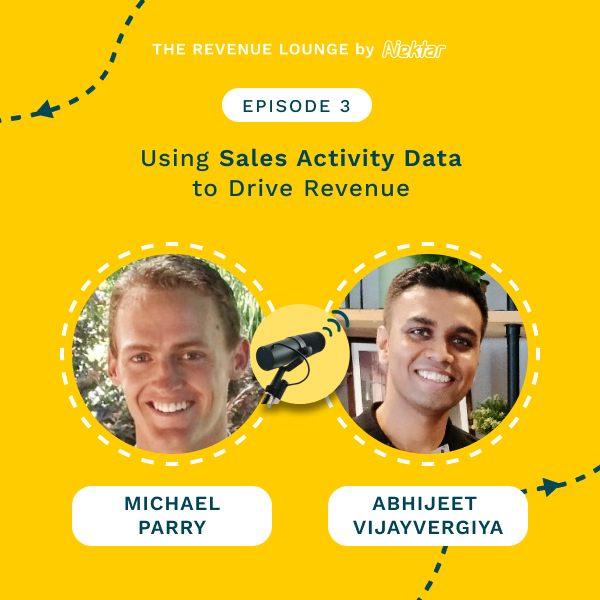
Ep #3: Using Activity Data to Drive Sales Productivity
Listen Now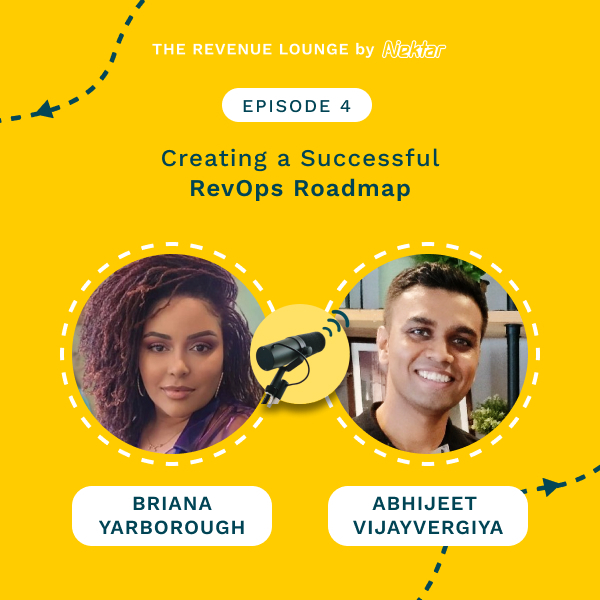
Ep #4: Creating a Successful RevOps Roadmap
Listen Now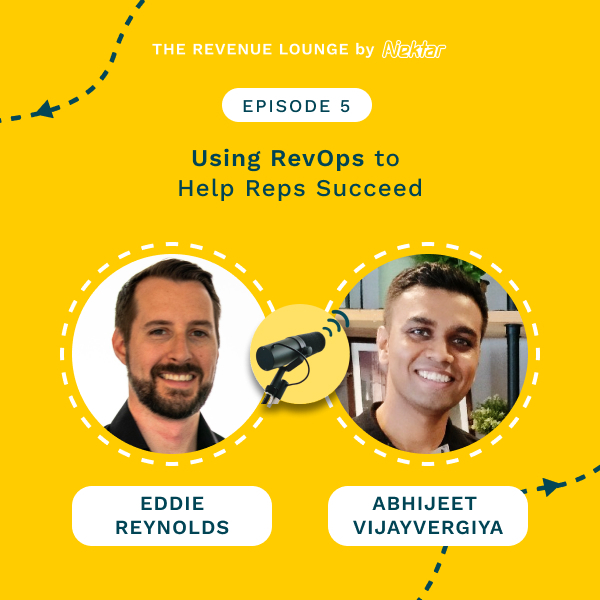
Ep #5: Using RevOps to Help Reps Succeed
Listen Now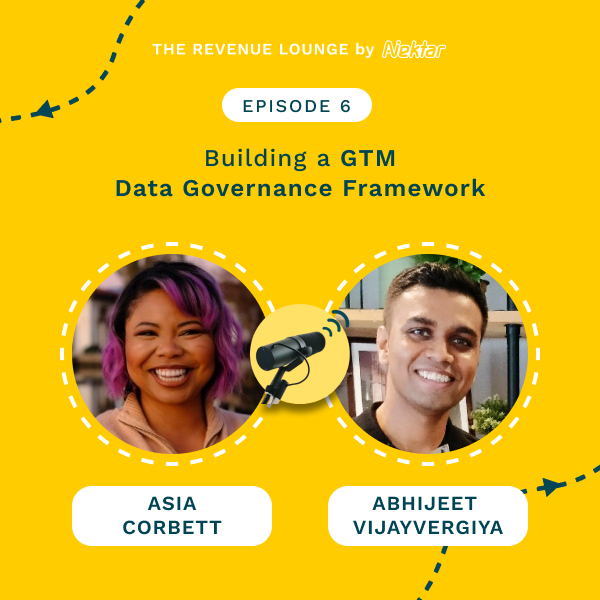
Ep #6: Building a GTM Data Governance Framework
Listen Now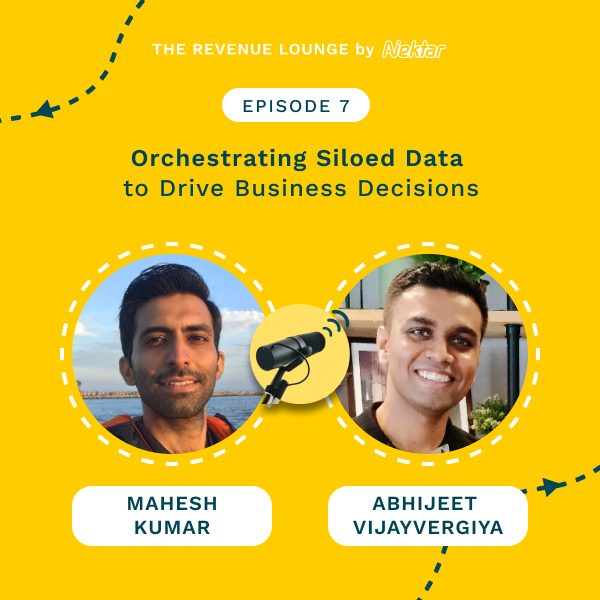
Ep #7: Orchestrating Siloed Data to Drive Business Decisions
Listen Now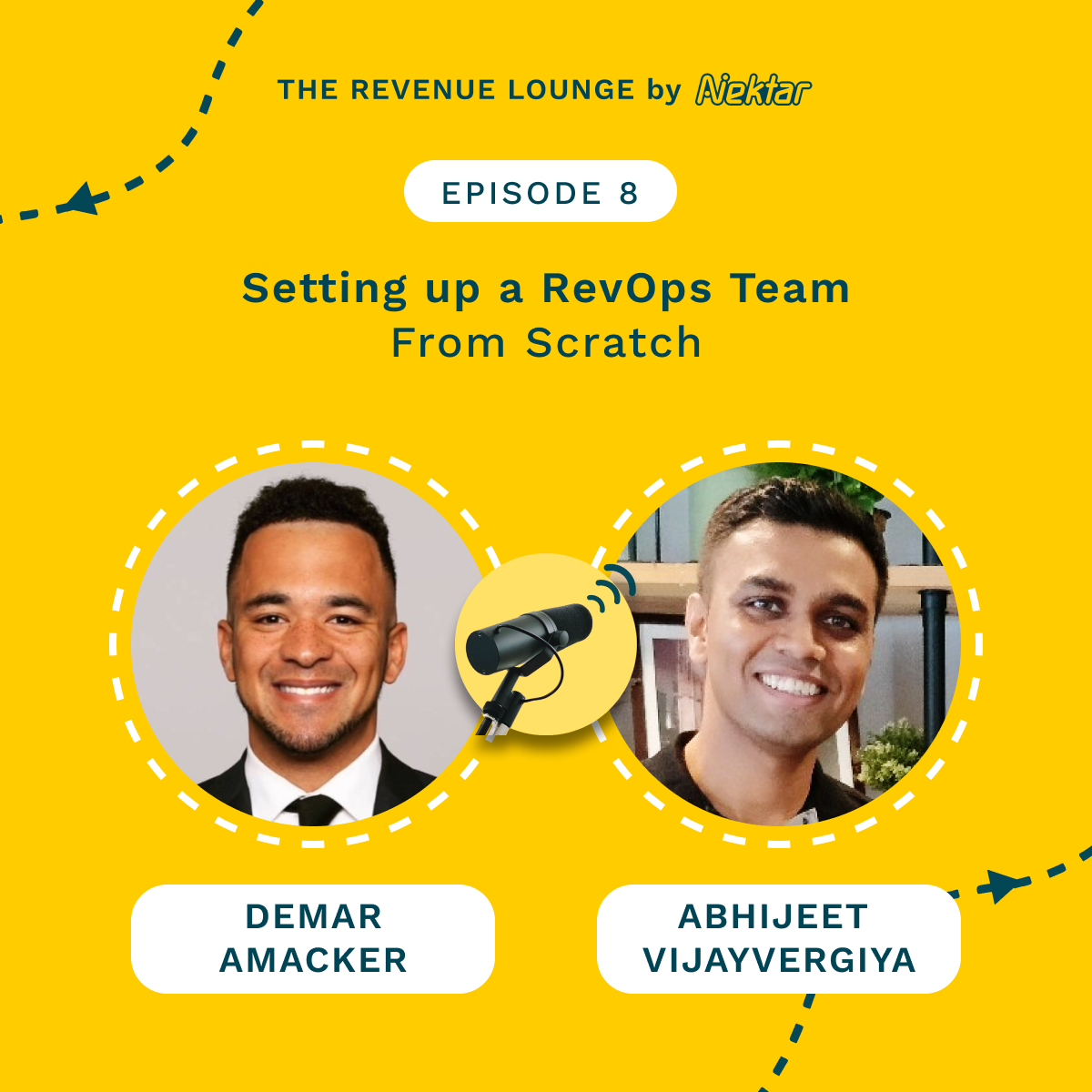
Ep #8: Setting Up a RevOps Team From Scratch
Listen Now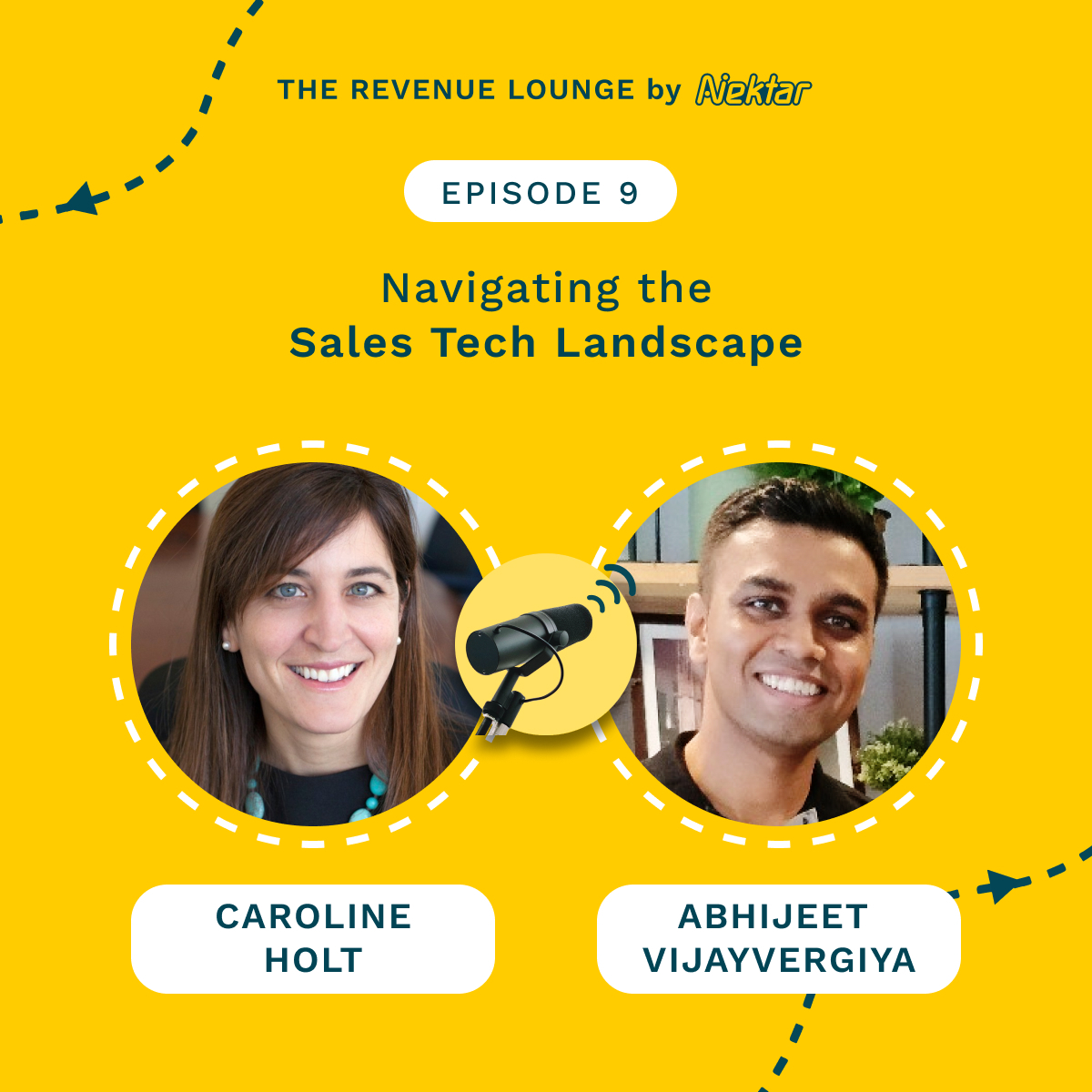
Ep #9: Navigating the Sales Tech Landscape
Listen Now